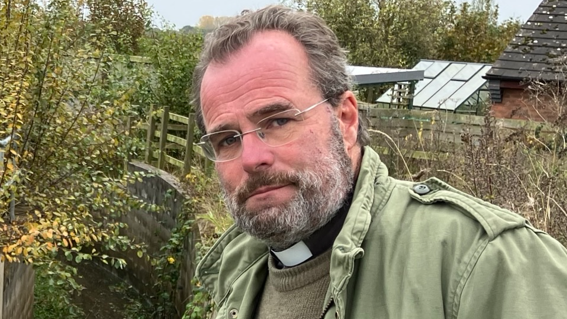Judge rules council must disclose water test results

Paul Cawthorne had asked the council to release the results of water testing
- Published
A judge has ordered a council to provide further details about a closed landfill site that may have released chemicals into a waterway near the protected Ironbridge World Heritage Site.
Stoneyhill, near Telford, was used by the former international chemical company Monsanto between 1985 and 1991.
A tribunal concluded that the authority must release information about the site, after it refused to give it to a local campaigner.
Telford and Wrekin Council said it would comply with the decision, and that information about the site "has been and continues to be" available on its website.
Monsanto ceased trading in 2016, but tests done on another of the firm's former sites found levels of now-banned chemicals more than 12,000 times higher than the recommended UK levels.
The former landfill was used to dispose of industrial, commercial and household waste, as well as animal carcasses.
A stream runs through the former landfill at Stoneyhill and down into Coalbrookdale and on into the River Severn.
Despite the soil and water in the stream being bright orange, both Telford & Wrekin Council and the Environment Agency had maintained that it was the result of iron mining.

The water at the site is orange in colour
The tribunal case was brought by Paul Cawthorne, a vicar turned citizen scientist, against the Information Commissioner’s Office (ICO).
In July 2023, Mr Cawthorne had asked the council to release the results of tests carried out at the site.
The authority refused to respond because it claimed the request met the legal test of being "manifestly unreasonable", under the Environmental Information Regulations (EIR).
Following this, the vicar complained to the ICO in November 2023, which upheld the council's decision not to respond.
The authority claimed it had received about 2,750 emails from Mr Cawthorne between January 2022 and September 2023, and alleged his tone was "aggressive" - points denied by Mr Cawthorne.
The ICO opposed an appeal by Mr Cawthorne, so he took the case to a tribunal, chaired by district judge Lindsey Moan.
Partial answers 'may have caused further questions'
That has concluded that concerns were not just those of Mr Cawthorne, and the language used in his emails to the council was "neither abusive, aggressive or harassing.”
“The tribunal had some concern that the intent of the council was to close the door of any further request of the appellant about this site at all," the judge said.
“There was no doubt that the requests were repetitious and persistent in requesting testing data but equally the information had not been provided."
Judge Moan added that providing partial answers may have led to further questions from Mr Cawthorne.
“If there are genuinely no concerns about the site, a pertinent question was why the information had not been released.
"We do not have the council’s answer to that question."
A Telford & Wrekin Council spokesperson said the authority had had no direct role in the appeal, as it was the decision made by the ICO.
"We will comply with the tribunal’s decision whilst also waiting to see if the Information Commissioner challenges the outcome."
"Information on Stoneyhill has been, and continues to be, available on the council website for public information."
An ICO spokesperson said it had received the judgement and it was being considered.
This news was gathered by the Local Democracy Reporting Service which covers councils and other public service organisations.
Get in touch
Tell us which stories we should cover in Shropshire
Follow BBC Shropshire on BBC Sounds, Facebook, external, X, external and Instagram, external.
- Published12 July 2024
